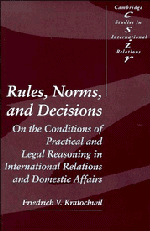 Rules, Norms, and Decisions
Rules, Norms, and Decisions Book contents
- Frontmatter
- Contents
- Acknowledgements
- Introduction: The resort to norms
- 1 Rules, norms, and actions: laying the conceptual foundations
- 2 Anarchy and the state of nature: the issue of regimes in international relations
- 3 The emergence and types of norms
- 4 The force of prescriptions: Hume, Hobbes, Durkheim, and Freud on compliance with norms
- 5 The discourse on grievances: Pufendorf and the “laws of nature” as constitutive principles for the discursive settlement of disputes
- 6 The notion of “right”
- 7 The question of “law”
- 8 The path of legal arguments
- Conclusion: The international legal order, international systems, and the comparative analysis of the practice of states
- Notes
- Index
Introduction: The resort to norms
Published online by Cambridge University Press: 01 June 2011
- Frontmatter
- Contents
- Acknowledgements
- Introduction: The resort to norms
- 1 Rules, norms, and actions: laying the conceptual foundations
- 2 Anarchy and the state of nature: the issue of regimes in international relations
- 3 The emergence and types of norms
- 4 The force of prescriptions: Hume, Hobbes, Durkheim, and Freud on compliance with norms
- 5 The discourse on grievances: Pufendorf and the “laws of nature” as constitutive principles for the discursive settlement of disputes
- 6 The notion of “right”
- 7 The question of “law”
- 8 The path of legal arguments
- Conclusion: The international legal order, international systems, and the comparative analysis of the practice of states
- Notes
- Index
Summary
HISTORICAL RECOLLECTION AND THE ESTABLISHMENT OF “FIELDS”
This book examines the role of norms in international life. To the extent that the focus is on interactions in the international arena, it is a book about international relations. To the extent that the investigation is interested in legal norms it is a book on legal theory. Insofar as issues of “interpretation,” “precedent,” and “sources of law” will be discussed, it is in a way a treatise on jurisprudence. To the extent that rules and norms are viewed as means to maintain social order, it is a book on social theory. Finally, to the extent that the analysis is occasioned by the re-reading of some of the classics of international law and political theory, it is – at least indirectly and without wanting to claim comprehensiveness or completeness – a study of political thought.
Locating the inquiry at the boundary or intersection of various established fields has obvious dangers because it may satisfy none of the respective specialists and draw the ire of all of them. Nevertheless, interdisciplinary works, when successful, have their own rewards. Two justifications can be tendered in support of such an enterprise. First, an interdisciplinary approach can pose new and theoretically interesting questions. It can show important conceptual and empirical links which are lost in the more specialized inquiries that take a well-defined “field of study” for granted.
- Type
- Chapter
- Information
- Rules, Norms, and DecisionsOn the Conditions of Practical and Legal Reasoning in International Relations and Domestic Affairs, pp. 1 - 20Publisher: Cambridge University PressPrint publication year: 1989
